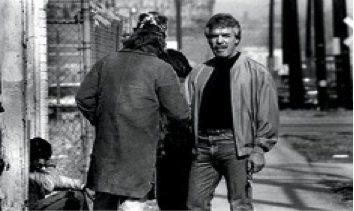
Bob Cote coined the term “a hand up, not a hand out,” but not until he dropped a half-drunk bottle of vodka on the street corner and said to himself, “enough is enough.” He stopped drinking right then and there after two years of chronic alcoholism. He had finally hit rock bottom and was going to change his life. Against all odds, he did. His name was Bob Cote, and he formed a charity called Step 13 to help chronic alcoholics in the heart of the homeless population in Denver, Colorado. It is still around today and is called Step Denver.
Over 30 years until he died in 2013, Bob wasn’t interested in making life more comfortable for alcoholics; he wanted to tackle the difficult problem of helping them to change their lives. He trademarked the phrase “a hand up, not a hand out”, which became the hallmark of his organization. The phrase is a common one today to describe how to help people to help themselves.
A Hand Up, Not A Hand Out is Our Mantra
What is our goal for charity and welfare – “a hand up or a handout?” It is the first question we have to ask ourselves. Who is it we are helping and what is it we are attempting to do? A person with severe disabilities may be in a situation where a “hand out” is perfectly appropriate. But for those that can, we want to help them to help themselves.
Tough Love
In Bob Cote’s world that meant he had to adopt some very tough love. He knew from personal experience that anything supplied to a chronic alcoholic just enabled the problem. Give them money and they spent it on booze. Give them food and they had more resources for booze. Give them food and housing and you were “killing them on the installment plan.” Bob was the one who said, “real change, not spare change.”
Bob insisted that you give up drinking when you came to Step 13 and he would test often to make sure it was true. Sometimes he’d do surprise tests a half-hour after the last one. Then he would provide the “hand-up”; a place to live, three meals a day, job training, etc., but not until then. He had a program for his clients to bring them back to functioning lives by steadily adding work responsibilities. The first job was making coffee in the morning and the responsibilities grew from there. If a man continued to progress, Bob continued to help. But stop working and Bob gave his aid to the next guy. It was the toughest of love and in the end, it saved thousands.
Comfort or Change?

Bob knew the easy way out for his clients was another drink and one after that. We can fall into a trap when we allow comfort and ease to be the result of our giving to those capable of doing more. Education, hard work, good decisions, and growth are what we ultimately hope to promote. There is nothing comfortable or easy about such pursuits. Bob understood that and was the master of tough love. Our welfare programs and many of our charities could use a big dose of that.
This blog supports the Ultimate Guide on How to Help the Poor – Be Hard Headed